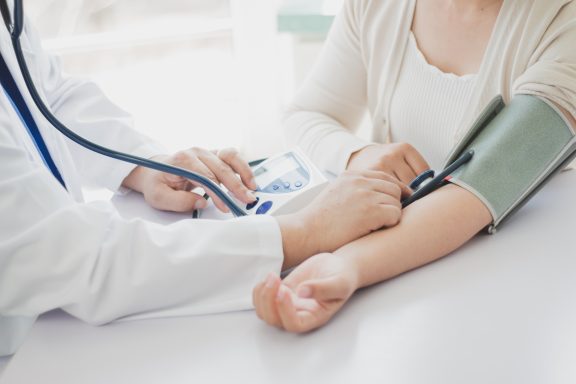Helping practices to be their best.
High Blood Pressure is a common medical condition and can cause a range of medical issues and be caused by a range of conditions. Medically known as hypertension, high blood pressure can be a major health concern if left untreated. With the support of your GP, high blood pressure can most often be effectively managed.
What is high blood pressure?
High blood pressure refers to when the force of the blood through blood vessels is too high - leading to more pressure being applied to the walls of veins and arteries.
Should I be worried about high blood pressure?
High blood pressure does not cause major health concerns unless suitably treated and managed.
High blood pressure, left untreated for long periods, can lead to atherosclerosis, which involves plaque formations causing blood vessels to become narrower, and subsequently, worsens the blood pressure.
Atherosclerosis caused by high blood pressure can have a number of detrimental health outcomes, including:
Stroke
Kidney failure
Amputation of limbs
Aneurysm
Heart attacks or heart failure
Blindness
Different types of high blood pressure
High Blood Pressure falls into two categories. If your high blood pressure is not caused by an underlying medical condition, it is referred to as primary hypertension. If another health concern has led to high blood pressure, it is called secondary hypertension.
Primary hypertension can occur due to a wide variety of causes, such as your blood plasma volume, environmental pressures or hormonal imbalances.
Secondary hypertension can be caused by some of the following health concerns:
Obesity
Pregnancy
Sleep apnoea
Hyperthyroidism
Kidney disease or CKD
Diabetes
Hyperparathyroidism
Congenital adrenal hyperplasia
Pheochromocytoma
Cushing syndrome
How is secondary high blood pressure treated?
Generally, changes in lifestyle and diet are immediately recommended to most people experiencing high blood pressure to minimise the symptoms.
- Exercise: Most doctors will recommend that their patients get at least thirty minutes of moderately intense physical activity every day. This is standard procedure for a wide range of medical conditions and may involve swimming, jogging, cycling or a similar level of activity.
- Diet: There are a variety of dietary changes you can make. Chat with your doctor for some further understanding.
- Mental Health: Often, the underlying causes of high blood pressure can be addressed through treating some mental health issues.
- Medication: Some medications can exacerbate high blood pressure, while some may be used to address it.
What causes high blood pressure?
The underlying cause of primary high blood pressure is often not known.
An underlying medical condition causes around 5% of primary high blood pressure. One of the most common causes is chronic kidney disease. As the kidneys fail to filter fluid out of the blood, blood pressure increases, resulting in high blood pressure.
Risk and contributing factors for high blood pressure
If you reduce exposure to these risk factors or potential causes as much as possible, you may avoid developing high blood pressure and/or reduce its severity.
Risk factors can include:
- Pre-existing health conditions – This may include diabetes, chronic kidney disease, high cholesterol levels or cardiovascular disease.
- Gender – Men are more likely to develop high blood pressure at a young age. In women, it is more common at older ages. However, the lifetime risk is roughly the same for both men and women.
- Vices – alcohol consumption and smoking can increase blood pressure and may be a contributing factor to hypertension.
- Ethnicity – Some ethnic backgrounds may be more likely to develop high blood pressure.
- Diet – A diet with a lot of salty, processed and fatty foods may increase the likelihood of developing high blood pressure.
- Lack of activity – leading a sedentary lifestyle is associated with high blood pressure.
- Weight – Your weight is a contributing factor. Overweight and obese people are more likely to develop high blood pressure.
- Age – Generally, your likelihood of developing high blood pressure increases over the age of 60. This is largely due to the steady build-up of plaque in blood vessels during your lifetime, resulting in narrower and stiffer arteries later in life.
What are the symptoms of high blood pressure?
In some cases, you can suffer from high blood pressure without showing any outward symptoms. High blood pressure is subsequently, sometimes referred to as “the silent killer”. Although you may not be displaying the signs of high blood pressure, it is entirely possible that it may be causing damage to your internal organs, such as the kidneys and cardiovascular system.
By regularly checking your blood pressure through check-ups with your GP, you can monitor your high blood pressure and be aware of any changes.
Diet and high blood pressure
Diet can absolutely affect high blood pressure. Following a few tips can help you reduce your risk of developing high blood pressure or help reduce its severity if you have already been diagnosed.
- Sodium: reducing the amount of salt you consume to less than five grams per day is strongly recommended by many health professionals as one way to reduce your risk of developing hypertension.
- Alcohol: lowering your alcohol consumption is generally recommended for moderate to excessive drinkers. However, maintaining a maximum level of two standard drinks a day for men and one for women can radically improve your blood pressure levels and may reduce your risk of stroke.
- Fruits and Vegetables: this is good advice for most people, but particularly so for those who may be suffering from or at risk for high blood pressure. Increase your vegetable intake! Everyone should be consuming several different varieties of fruits and vegetables per day.
If you are concerned about your blood pressure, book an appointment with your doctor to receive a test and preventative advice.

